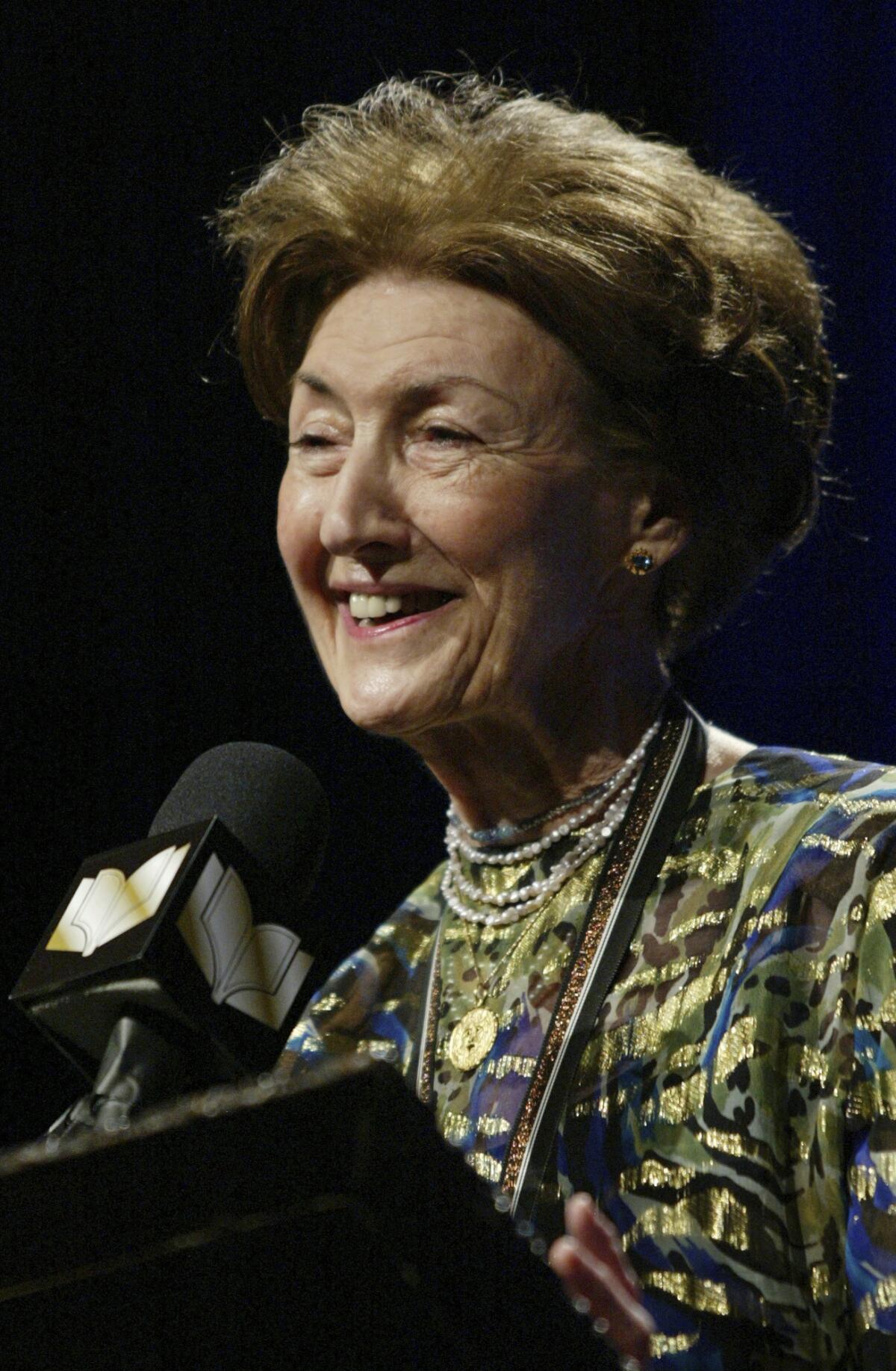Award-winning novelist Shirley Hazzard, who wrote of love disrupted, dies at 85

- Share via
Shirley Hazzard, an award-winning novelist who wrote of love affairs disrupted and intensified by age, distance and war, has died at 85.
Hazzard had been in failing health and died Monday at her home in Manhattan, according to her friend Frances Alston.
For the record:
12:55 p.m. Jan. 23, 2025The headline on an earlier version of this article incorrectly said that Shirley Hazzard was 95 when she died. She was 85.
She was a writer of pre-digital tastes who composed on a yellow legal pad and had no interest in computers or even an answering machine. Her novels, too, had a vintage wealth of detail and introspection that drew comparisons to Henry James and some criticism that the sophistication of her prose interfered with the enjoyment of the narrative.
Peers and awards judges recommended her highly. “The Transit of Venus,” published in 1980, won the National Book Critics Circle prize. Hazzard also was a three-time National Book Award finalist and won in 2003 for “The Great Fire.”
Her other books included the short story collections “Cliffs of Fall” and “People in Glass Houses.” Hazzard also wrote a memoir about her friend Graham Greene, “Greene in Capri,” and two books about the United Nations, where she worked in the 1950s: “The Countenance of Truth” and “The Defeat of an Ideal.”
Rare was the happy marriage or simple romance in a Hazzard book. From early stories such as “A Place in the Country” to the novel “Bay of Noon,” she wrote of strained and cold relationships and the inevitable search for outside comfort. True passion was often forbidden. Hazzard acknowledged that “The Great Fire,” about a tender affair between a young Australian woman and a British soldier in World War II, was based on her own youthful romance that her parents had ended.
The author did find love in New York in 1963 when she met author and translator Francis Steegmuller at a party hosted by novelist Muriel Spark.
Hazzard, the daughter of a diplomat, was born in Sydney in 1931 and lived throughout Asia as a young woman. “The Great Fire” was inspired partly by people she knew in the late 1940s in Hong Kong, where she helped monitor the civil war in China on behalf of British intelligence.
“The literary atmosphere of that office — British officers, linguists, young veterans who were almost innately charged with literary reference — was joyful,” she later told The Paris Review. “For the first time, I could share literature with delight and freedom.”
Hazzard never attended college but compensated with self-education — reading and traveling constantly. In her early 20s, she joined the United Nations and spent a decade in the General Service division, which she would jokingly call “the dungeon.”
She did at least have spare time to work on writing. An early short story was accepted by The New Yorker, and “Cliffs of Fall” was published in 1963 to encouraging reviews. “Bay of Noon,” released in 1970, found a new readership 40 years later. It was shortlisted for the Lost Man Booker Prize, established for fiction from 1970 that, because of rule changes at the time, was not eligible for the 1970 or 1971 Booker award.
Honors would come quickly for “The Transit of Venus,” her widely praised novel about two sisters from Australia and their unfortunate love for the brilliant, but self-absorbed playwright Paul Ivory. Hazzard based Paul on a famous writer she met when he was young and relatively unknown. She declined to reveal his identity, but did discuss how she assembled a fictional creation out of the scraps of a real one.
“I decided certain things about his ambitions interested me; he was quite hard, although he knew what tenderness was,” she told the Associated Press in 2003. “And sometimes I encountered something in my life, an action or a remark, and I thought, ‘That goes to Paul.’ You are starting to build that character, and you begin to observe things that character would embody.”
More than 20 years passed before “The Great Fire” came out. The author worked at a careful pace, with early drafts written on a legal pad, then revised on an electronic typewriter. When an idea arose unexpectedly, she would jot it down on a scrap of paper, then store it with other notes in an envelope. She received many letters about “Transit of Venus” — fan mail early on, then letters asking when her next book was coming.
“I felt so embarrassed I had nothing to tell them,” she told the AP. “It (writing a book) seems an imposition unless you can do something you really believe wouldn’t be like what anybody else is doing.”
More to Read
Start your day right
Sign up for Essential California for the L.A. Times biggest news, features and recommendations in your inbox six days a week.
You may occasionally receive promotional content from the Los Angeles Times.






